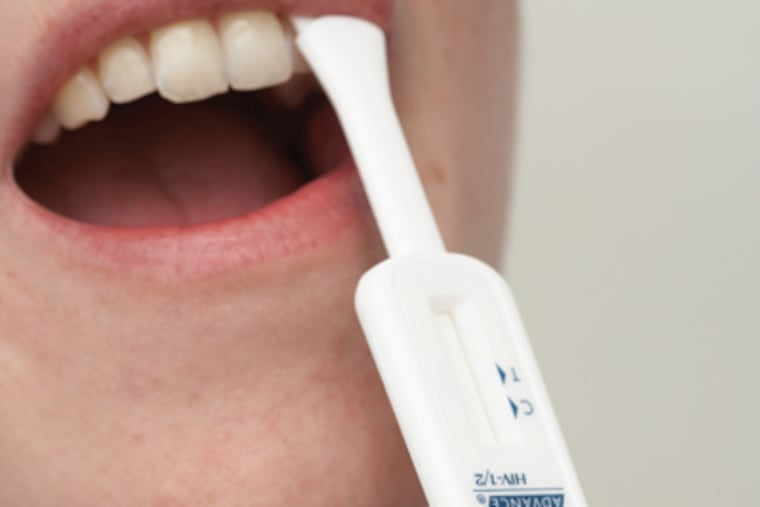FDA panel recommends rapid home HIV test
A federal advisory committee on Tuesday unanimously approved over-the-counter sale of a rapid HIV test, acknowledging the need for new tools against an epidemic that is driven largely by people who don't know their status and infect others.

A federal advisory committee on Tuesday unanimously approved over-the-counter sale of a rapid HIV test, acknowledging the need for new tools against an epidemic that is driven largely by people who don't know their status and infect others.
If the Food and Drug Administation agrees with its advisers, the oral swab screening device made by OraSure Technologies Inc. of Bethlehem, Pa., would become the first infectious disease test approved for home use.
The panel overcame considerable unknowns and concerns the test cannot pick up newly acquired infections to focus on a bigger picture.
"I still can't get past the quarter-million people who don't get tested," said member Steven W. Pipe, a pediatrics and communicable diseases specialist at the University of Michigan.
An estimated 240,000 Americans are unaware that they are HIV positive, and are responsible for between 50 and 70 percent of the 50,000 new infections each year.
The test uses oral fluid from a swab of the gums. If a single horizontal line appears after 20 minutes, it has not detected antibodies to HIV. Two lines mean it is HIV positive, a preliminary finding that must be confirmed by a laboratory blood test.
"We believe we are at a deciding moment in the trajectory of the AIDS epidemic," Phill Wilson, executive director of the Black AIDS Institute, told the panel, referring to treatments that dramatically reduce transmission of HIV, the virus that causes AIDS. "The key to that begins with getting them tested."
The company has not disclosed a retail price or projected sales, although it estimated that the entire market for rapid home HIV tests at $500 million retail. FDA staff projected that the test would be used by 2.8 million people in the first year. It would discover about 45,000 infections that otherwise would have remained unknown, and in turn, prevent HIV from spreading to another 4,000 people, the agency said.
But it also would result in several thousand false negatives, either because consumers didn't use it properly or their infections were too new to trigger the immune system response that produces antibodies picked up by the test.
Much of Tuesday's discussion among the advisory committee was about labeling and other ways to make clear to people at high risk of HIV that a negative test should be repeated three months later or confirmed with a laboratory blood test. Of particular concern was that people not use a negative result as a free pass to engage in risky sex.
The company has said that each test kit would include two booklets - one with detailed information about HIV and the other on the meaning of test results - in English and Spanish. It also would refer people to a 24-hour call center. In addition to helping people understand their test results, the bilingual staff would be trained as crisis counselors and could link callers to local counseling and a medical treatment.
In a teleconference with reporters after the advisory panel's 17-0 vote, OraSure officials said they would immediately begin working the FDA to address labeling issues.
"We are extremely pleased with the outcome of today's meeting," said Douglas A. Michels, president and CEO of the company, which has 270 employees.
In after hours trading on the NASDAQ index, as of 7:30 p.m., OraSure's share price rose by $3.08 - or 34 percent - to $12.18 a share.
The company has sold more than 25 million rapid HIV tests to clinics and testing centers around the world since 2002, when it won approval for the first rapid blood test for HIV. All were manufactured in Bethlehem.
The product that was recommended for home use on Tuesday is identical to the oral version of that test, which was approved in 2004, except for the packaging, labeling, and support services.
As a result, the company has said it could begin selling the test at pharmacies and online within 60 days of approval by the FDA. The agency typically follows its advisers' recommendations but is not required to.
More than 20 HIV activists, doctors, and public health workers testified at the Blood Products Advisory Committee hearing. They overwhelmingly supported the OraQuick In-Home HIV Test, often in passionate terms.
"I envision my parishioners coming to me and saying, 'Pastor, will you sit 20 minutes while I take the test?' " said Calvin O. Butts 3d, of the Abyssinian Baptist Church in New York, adding that they might never go to a clinic for a test and so would never know if they had HIV.
Tom Donohue, who grew up in Williamsport, Pa., recalled discovering he was HIV positive while a student at Penn State University.
"I know what it's like to wait for results, I know what it's like to share my sexual history before a community member who is an HIV tester," said Donohue, who founded and is executive director of Who's Positive, an HIV awareness organization.